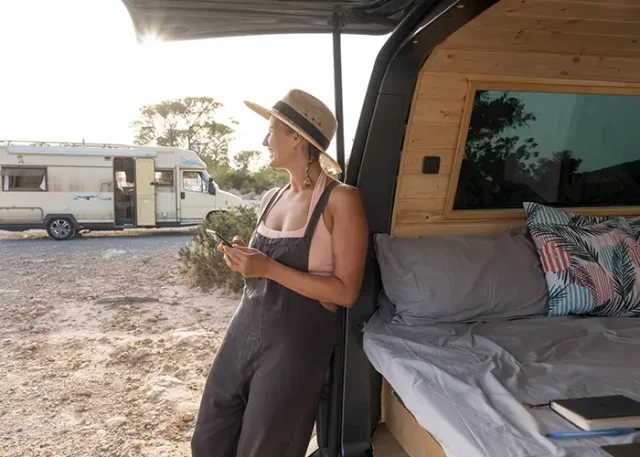
Heading off-grid feels like a reset. Stars overhead, quiet roads, self-reliance, bliss!
Yet rugged freedom comes with responsibility. We travel smarter when planning covers safety, comfort, and respect for wild places.
Below, find six practical considerations to prepare for remote journeys, written for travellers who value adventure without surprise.
Why careful prep matters
Going far from services means choices carry consequences. Small oversights can turn a great trip into a long wait. With modest planning, most problems stay small. We focus on realistic steps that keep you safe, save you money, and help preserve the places you visit.
1. Power: keep essentials running
Power makes modern life easier, even when off-grid. Lights, navigation, communication, and refrigeration all depend on reliable energy.
Key options:
- Solar panels are sized to charge the battery bank each day.
- Dual-battery setups for vehicles with isolation relays.
- Portable power stations for small appliances.
- High-capacity power banks for phones and GPS devices.
- Efficient LED lighting and low-draw devices.
Quick checklist:
- Test solar output on a cloudy day.
- Label fuses and switches for fast troubleshooting.
- Carry spare cables, an inverter, and fuses for common models.
Conserve use by prioritising devices. We charge radios and emergency phones before luxuries.
2. Water and food: plan for limited resupply
Water weighs a lot, yet it keeps us alive. Food must last and fuel bodies for long hikes.
Water tips:
- Carry at least four litres per person, per day as a baseline.
- Bring a high-quality filter and chemical tablets as backup.
- Learn to source and treat local water safely.
Food planning:
- Choose calorie-dense, low-perishables: nuts, dehydrated meals, canned proteins.
- Pre-portion meals to keep cooking simple.
- Pack a lightweight stove, a wind shield, and spare fuel.
Storage note: Secure food in vehicle or bear-proof containers where wildlife presents a risk. Keep perishables in well-ventilated coolers and consume early in the trip.
3. Communication and navigation: keep a line open
Signal often fails where adventure begins. Redundancy plan.
Offline navigation:
- Download maps for all likely routes to your phone and a dedicated GPS.
- Print simple route notes and emergency contacts.
Staying connected:
- Consider an eSIM option for wider data availability when cellular towers exist. Before departure, learn about providers and their coverage and pricing by reading guides on staying connected with an eSIM.
Secure communication:
- Carry a satellite messenger or personal locator beacon for true emergency location.
- Protect sensitive browsing on public connections by learning methods to safeguard online privacy while away, thereby reducing risks.
Practice using devices at home before relying on them in the field.
4. Safety and medical readiness
Minor injuries can quickly become major without proper care. Aim to stabilise incidents until help arrives.
First-aid essentials:
- Comprehensive first-aid kit with trauma supplies, splints, and wound packing.
- Extra prescription medicines and copies of prescriptions.
- Training in basic first aid, CPR, and wound management.
Risk reduction:
- Tell someone a clear itinerary and check-in schedule.
- Carry multifunction tools, a reliable knife, and a fire-starting kit.
- Pack burn and bite-care items if you’re in a country with snakes or insects.
When serious incidents occur, stay put if movement risks more harm and use your emergency beacon.
5. Vehicle and gear preparation
Vehicles and gear must endure rough ground and prolonged use.
Vehicle checklist:
- Service brakes, fluids, belts, and the cooling system before the trip.
- Stock spare tyre, repair kit, and long-reach jack.
- Bring recovery straps, shackles, and a shovel for soft sand or mud.
- Test battery and charging systems under load.
Gear tips:
- Quality sleeping system rated for expected temperatures.
- Durable shelter and tarps to protect gear from afternoon storms.
- Light, layered clothing and sturdy boots.
Practice common repairs at home so hands know what to do under pressure.
6. Insurance, permits, and responsible travel
Legal protection and respect for local rules keep trips legal and ethical. Before heading off, confirm insurance covers off-grid use, click here for more information on caravan insurance.
Permits and access:
- Research land access rules and required permissions for camping or driving on remote tracks.
- Respect seasonal closures and cultural site protections.
- Pack out all waste, minimise fire impact, and stay on established tracks.
- Support local communities whenever possible by utilising local services and adhering to guidelines.
Insurance note: Coverage should match travel type, vehicle, and intended activities. Review policy exclusions and carry proof of insurance while travelling.
A compact pre-trip checklist
Before departure, walk through this quick list with trip mates:
- Confirm battery and solar operation.
- Pack three days of extra water and food in case of delays.
- Load offline maps and test the satellite messenger.
- Update or print emergency contacts and route plan.
- Service vehicle and carry spares for likely failures.
- Verify insurance, permits, and health supplies.
Check everything twice and run a short trial day nearby to reveal weak points.
Final thoughts: Comfortable confidence
Remote travel rewards careful planning. When power, water, communication, safety, vehicle, and paperwork align, focus shifts from worry to wonder. We travel lighter when prepared, kinder to landscapes when respectful, and safer when choices match risk level.
Safe trails and clear skies, enjoy the off-grid life!





